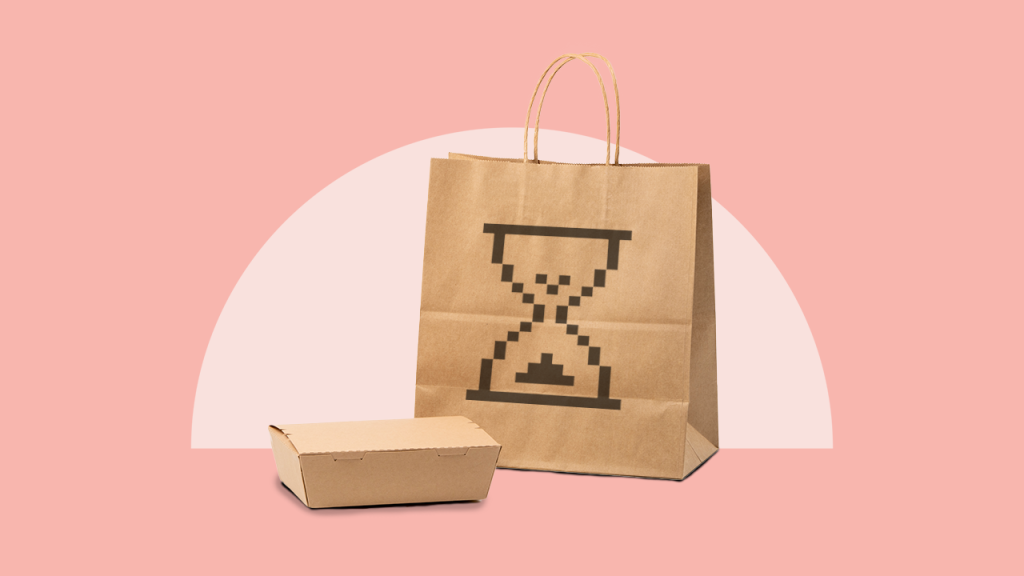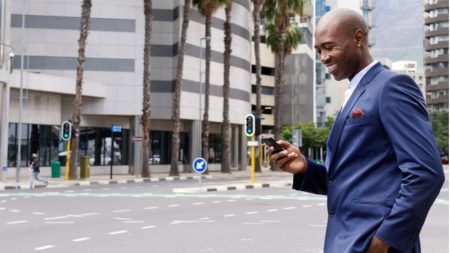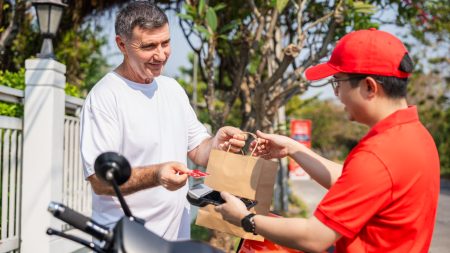Imagine a scenario in which you’re about to finalize a loan — and the lender suddenly quotes a higher APR than you expected. You’re surprised, disappointed and wondering what happened. “Well,” the loan officer explains, “There’s a delinquent buy now, pay later loan on your credit report that dropped your credit score a notch below the range needed for our lowest rates.”
And it hits you: The small buy now, pay later (BNPL) loan you forgot to repay is coming back to bite you.
That’s another reason to call one BNPL lender’s new partnership with food delivery app DoorDash (announced March 20) “bite now, pay later.”
No, taking out “burrito loans” for takeout generally isn’t wise. Here’s why.
1. If you’re borrowing to pay for food, you might have bigger fish to fry.
Using consumer loans can be a good option if you’re able to secure a competitive interest rate for funds that fulfill a need or help you meet a financial goal (such as using a personal loan to consolidate debt). But BNPL for food delivery just fills your stomach; DoorDash (and similar services) also transports groceries to fill your fridge. And sure, many customers (yours truly included) already rely on credit cards to cover such splurges.
But about 51 percent of Americans who use BNPL do so out of necessity (compared to 46 percent whose reason is convenience), according to a March 2025 report from data platform PYMNTS Intelligence.
We’re concerned about that 51 percent figure: If you grow reliant on BNPL to “get by” because of spotty cash flow or, more drastically, to stave off food insecurity, it’s not a long-term solution. It’s a sign that you need to shore up your personal finances. It would behoove all of us to create a budget, for example, and rely on solutions that don’t involve incurring debt, such as local resources found by dialing 211.
2. The accessibility of BNPL can lead to accumulating debt
In a press release announcing the Klarna-DoorDash accord, an executive from the BNPL lender said, “… we’re making convenience even more accessible for millions of Americans.”
But that convenience comes at a cost, even if you’re among the relatively more financially secure and don’t rely on BNPL for pressing needs.
January reporting from the Consumer Financial Protection Bureau (CFPB) highlighted some of the most worrisome BNPL trends:
- BNPL users are more likely to have higher amounts of consumer loan (non-mortgage) debt than those who don’t use this form of financing.
- They’re borrowing repeatedly, sometimes carrying multiple BNPL loans simultaneously.
- More than 6 in 10 BNPL users have subprime credit scores (below 620).
This concept makes me nervous, to be honest. It’s a discretionary purchase, and if you’re splitting a $20 Chipotle order into four installments of $5 to be repaid over the next six weeks, is that a sign of financial distress? It could be. I know some people like to smooth out their cash flow, and they say, ‘How bad could an interest-free loan be?’ But it’s a slippery slope that can lead to overspending. Especially since a lot of BNPL users are young people with lower incomes and lower credit scores.— Ted Rossman, Bankrate senior credit card analyst
Put plainly: Borrowing to pay for that burrito, bánh mi or beef tenderloin is risky if you already have debt to repay, continually rely on BNPL for quick fixes or don’t have the best credit history.
Believe it or not, the plastic in your wallet might be a safer option, assuming you can zero your monthly balance.
3. BNPL lacks the consumer protections of credit cards
You might hear the argument that most of us already borrow money to pay for food when we swipe our credit cards. But aside from the cash-back or other rewards of credit cards, that form of financing also features law-of-the-land consumer protections. The CFPB attempted to mimic these protections for BNPL via an interpretative rule (read: a rule without teeth) that would have made it easier for customers to submit disputes, request refunds and receive billing statements from BNPL lenders.
But you might already know the end of this story: The Trump Administration has moved to dismantle the CFPB and has signaled that it will withdraw the rule altogether.
Without these protections in place, you might be wise to reduce your use of BNPL, not expand it to this new shopping category. After all, BNPL customers regularly report issues:
Takeaways from Bankrate’s buy now, pay later survey (2024)
- 56 percent of users say they experienced at least one problem while using a BNPL service
- 29 percent report that their BNPL use led to overspending
- 18 percent experienced difficulty returning a purchase or obtaining a refund
- 18 percent admit they missed a payment
Source: Bankrate’s buy now, pay later survey (2024)
4. BNPL can harm (but won’t improve) your credit
Historically, the thread between your credit and BNPL has only been knotted on one side: Make your payment on time, and move on without a record of it. But if you become delinquent, your late payment could be reported to the credit bureaus, taking up residence on your credit report and damaging your credit score.
That’s starting to change. Klarna competitor Affirm began reporting its customers’ accounts (current or otherwise) to Experian on April 1, undoubtedly the first domino to fall toward widespread credit reporting among other BNPL lenders. It’s hard to imagine that this reporting won’t impact your credit scores.
At that point, the imaginary scenario we started with could become reality. While missing payments on a small-dollar BNPL loan is unlikely to ding your credit as much as a larger-dollar personal, student or auto loan, a delinquent debt is a delinquent debt. As one national lender recently told Bankrate, referring to its personal loan underwriting standards: “We consider BNPL the same way we consider any other installment loan.”
Translation: If you’re late repaying a BNPL loan, yes, it could come back to bite you the next time you’re seeking credit.
Bottom line
No, this isn’t an avocado toast argument — occasionally splurging on takeout isn’t going to jeopardize your retirement savings. Still, using BNPL for delivery can impact your credit health, sink you deeper into debt and serve as a sign of bigger financial problems. It flies in the face of tried-and-true personal financial advice: Only borrow what you truly need and can realistically afford (and remember) to repay.
Read the full article here









